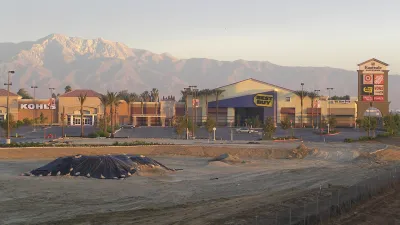The California Natural Resources Agency posted the final version of amendments to the California Environmental Quality Act, enabled by 2013's SB 743, at the end of 2018.

Melanie Curry reports on the long-awaited adoption of California's SB 743—a bill signed in 2013 to reform the California Environmental Quality Act by ending the use of Level of Service as a metric for development impact. Vehicle miles traveled is now the preferred metric. Curry refers to Level of Service as car delay, and environmentalists and smart growth advocates have long noted that it's a strange way to measure environmental impact.
"The [new] rules say that vehicle miles traveled–the amount in distance of automobile travel produced by a project–is a more appropriate measure of transportation impacts than vehicle delay," explains Curry. "Specifically, the new rule states that 'a project’s effect on automobile delay shall not constitute a significant environmental impact.' In addition, development projects within a half-mile of high quality transit are presumed not to have a significant environmental impact."
The bill that passed in 2013 might have shot higher than the final rules produced by the Governor’s Office of Planning and Research, however, after compromises during the rule making process. For instance, "planners will be allowed 'discretion' on which measure to use–so they could choose to stick with the outdated and discredited Level of Service metric," reports Curry.
"The new rules take effect immediately as advisory, but by June 2020 they will apply to all new environmental analyses," according to Curry. For more information on the final bureaucratic actions that put the new rules into advisory effect, see an article posted by Norman F. Carlin, Kevin Ashe, and Eric Moorman on the Pillsbury Law website.
FULL STORY: At Last, New Rules Are Final: Car Delay Is (Sometimes) NOT an Environmental Impact

National Parks Layoffs Will Cause Communities to Lose Billions
Thousands of essential park workers were laid off this week, just before the busy spring break season.

Retro-silient?: America’s First “Eco-burb,” The Woodlands Turns 50
A master-planned community north of Houston offers lessons on green infrastructure and resilient design, but falls short of its founder’s lofty affordability and walkability goals.

Delivering for America Plan Will Downgrade Mail Service in at Least 49.5 Percent of Zip Codes
Republican and Democrat lawmakers criticize the plan for its disproportionate negative impact on rural communities.

Test News Post 1
This is a summary

Test News Headline 46
Test for the image on the front page.

Balancing Bombs and Butterflies: How the National Guard Protects a Rare Species
The National Guard at Fort Indiantown Gap uses GIS technology and land management strategies to balance military training with conservation efforts, ensuring the survival of the rare eastern regal fritillary butterfly.
Urban Design for Planners 1: Software Tools
This six-course series explores essential urban design concepts using open source software and equips planners with the tools they need to participate fully in the urban design process.
Planning for Universal Design
Learn the tools for implementing Universal Design in planning regulations.
EMC Planning Group, Inc.
Planetizen
Planetizen
Mpact (formerly Rail~Volution)
Great Falls Development Authority, Inc.
HUDs Office of Policy Development and Research
NYU Wagner Graduate School of Public Service



























